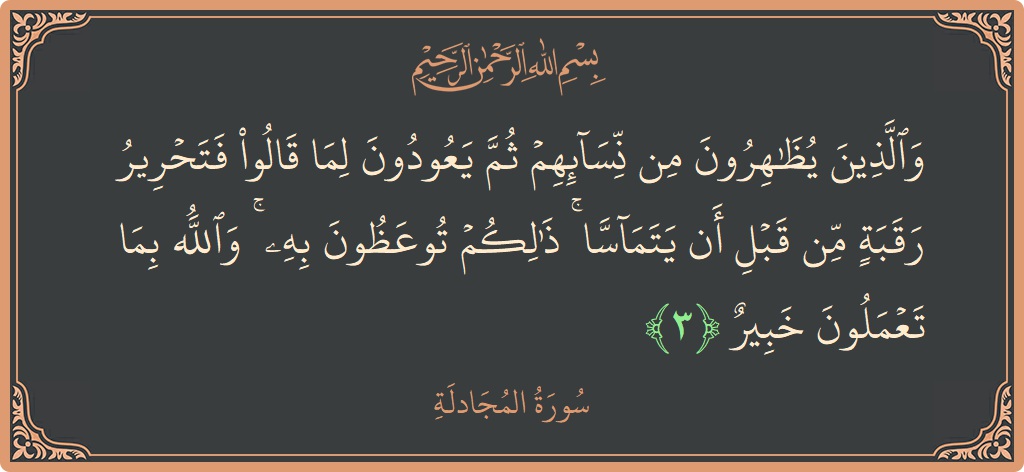Surah Al-Mujaadila: Verse 3 - والذين يظاهرون من نسائهم ثم... - English
Tafsir of Verse 3, Surah Al-Mujaadila
English Translation
And those who pronounce thihar from their wives and then [wish to] go back on what they said - then [there must be] the freeing of a slave before they touch one another. That is what you are admonished thereby; and Allah is Acquainted with what you do.English Transliteration
Waallatheena yuthahiroona min nisaihim thumma yaAAoodoona lima qaloo fatahreeru raqabatin min qabli an yatamassa thalikum tooAAathoona bihi waAllahu bima taAAmaloona khabeerunTafsir of Verse 3
The Expiation for Zihar
وَالَّذِينَ يُظَاهِرُونَ مِن نِّسَائِهِمْ ثُمَّ يَعُودُونَ لِمَا قَالُوا (And those who declare zihar against their wives, then retract what they said, ...58:3). The preposition lam in the phrase يَعُودُونَ لِمَا قَالُوا "...retract what they said..." is used in the sense of ` an [ from ]. Sayyidna Ibn ` Abbas ؓ interprets 'retract' in the sense of 'regret': 'they regret what they said and wish to be intimate or cohabit with their wives'. [ Mazhari ]
The verse shows that the penalty has been imposed on the husband for the purpose of making the wife lawful - without it she cannot become lawful to him. zihar per se is not the cause of the expiation. In fact, zihar is a heinous sin for which repentance and seeking pardon and forgiveness is absolutely necessary. The concluding part of verse [ 2] وَإِنَّ اللَّـهَ لَعَفُوٌّ غَفُورٌ "...Allah is surely Most-forgiving, Very-Merciful." points to this fact. In other words, Allah in His great mercy has made allowance for man's weaknesses and He is always ready to forgive his lapses, provided he comes to Allah with a penitent heart and makes amends. However, if a person did commit zihar and does not wish to take back his wife and enjoy intimacy with her, expiation is not obligatory on him. However, destroying a wife's conjugal rights is unlawful. If she demands, it is obligatory for him to pay the expiation and take her back, should he wish to do so; or if she demands, he must divorce her and set her free from the bond of marriage. If he does not divorce her and set her free, then she has the right to apply to a Qadi or an Islamic court to compel him to either pay the expiation and take her back or to divorce her and set her free so that she could contract a second marriage. Islamic works on jurisprudence set down details of the laws pertaining to zihar.
The penalty for zihar is obligatory, which is given in this and the next verse. There are three options: [ 1] فَتَحْرِيرُ رَقَبَةٍ (...obligated on them is to free the neck [ of a slave ]...) [ 2] If a person cannot afford to do that, he must keep fast for two consecutive months; and [ 3] if he is so weak or ill that he cannot fast, then he must feed sixty poor people. The expiation will be fulfilled if one poor person is given two meals for sixty days. Alternatively, it is possible to give two meals to sixty poor persons on a single day. In each case, the poor should be fed to their fill. Another possible alternative is to give to a poor person about 1.6 kg wheat or 2.12 kg dates or barley for sixty days or the equivalent price of these food items may be given. The details of the law appertaining to zihar and its expiation are available in the texts of Islamic jurisprudence.
It is recorded in Traditions that when Sayyidah Khaulah ؓ complained to Allah's Messenger ﷺ about her husband and pleaded her case to Allah, verses relating to zihar and its expiation were revealed. So, Allah's Messenger ﷺ called for the husband. When he came, the Holy Prophet ﷺ noticed that he was a weak-sighted old man. He recited to him the verses resolving his case, and commanded him to emancipate a slave, he said that he does not have the means to do that. The Holy Prophet ﷺ then asked him to fast two successive months, to which he replied: "By Him Who has sent you as the true Messenger, if I do not have two or three meals a day, I lose my sight completely." The Holy Prophet ﷺ said 'Then feed sixty poor people'. He said 'I do not have the ability for that either, unless you help me'. The Holy Prophet ﷺ gave him some food grain, and also other people gathered more food grain for him, which amounted to the measure of sadaqatul-fitr for sixty poor men, and in this way the expiation was made. [ Ibn Kathir ]
